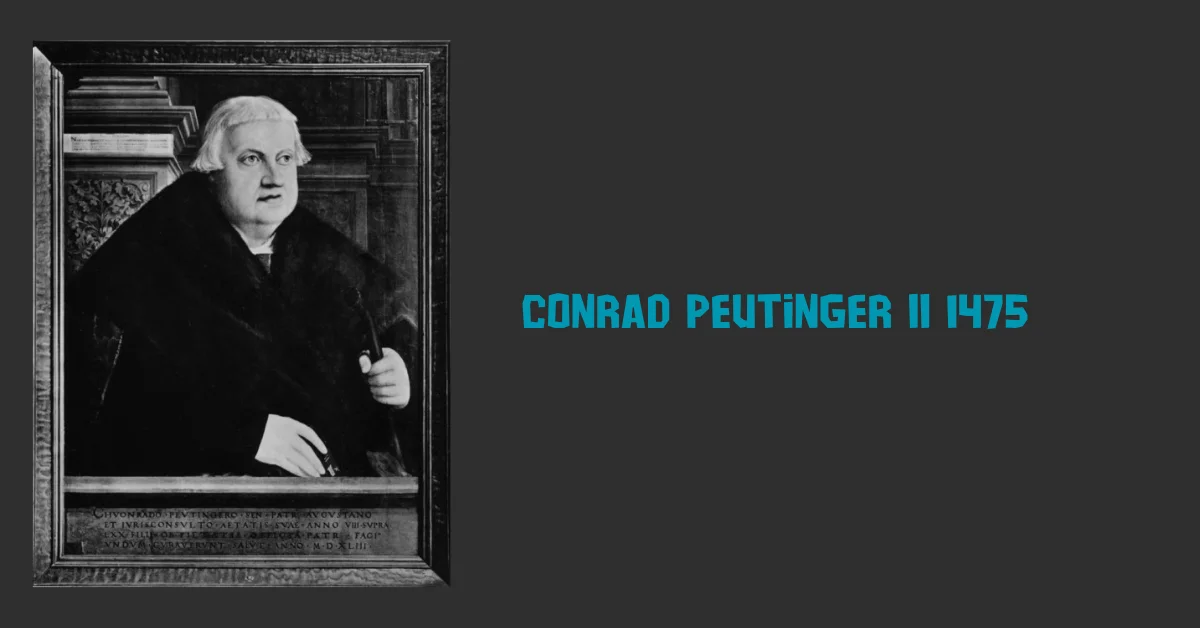Conrad Peutinger II 1475: Navigating Politics and Scholarship in the Renaissance
Conrad Peutinger II, born in 1475 in Augsburg, Germany, was a remarkable figure during the Renaissance. He was a well-educated man, known for his work as a scholar, humanist, and political figure. Peutinger’s influence extended across many disciplines, including law, classical studies, history, and diplomacy. His enduring legacy, however, is most closely tied to his role as a collector of ancient manuscripts. Especially Roman documents, and his contribution to the preservation of European historical knowledge. This article delves into Peutinger’s life, achievements, and significance in shaping Renaissance scholarship.
Conrad Peutinger II Early Life and Education
Born into a wealthy and influential family, Peutinger had access to education and resources that enabled his intellectual growth. His father, Conrad Peutinger I, was a prominent figure in the city of Augsburg, and the family’s wealth was derived from their successful involvement in the legal and commercial sectors. From an early age, Conrad II was exposed to the humanist ideals of the time. Which emphasized a return to the classical antiquities and the study of ancient Greek and Roman texts. Conrad Peutinger II attended university in Italy, a hub for Renaissance humanism. He studied law at the University of Padua, one of the most prestigious institutions in Europe at the time. It was in Padua that Peutinger was exposed to a world of classical knowledge and antiquities that would shape his future scholarly pursuits. He was deeply influenced by the works of Roman historians and philosophers.
The Role of Humanism in Peutinger’s Work
Peutinger’s humanist beliefs were reflected in his commitment to the revival of classical knowledge. He was an advocate for the study of Greek and Roman texts, and he played a pivotal role in the rediscovery and dissemination of these works throughout Europe. His contributions in this area helped bridge the gap between ancient knowledge and modern thought, making him a key figure in the spread of humanist ideals.
Conrad Peutinger II Political and Diplomatic Career
Upon returning to Augsburg, Conrad Peutinger II embarked on a successful career as a lawyer and a politician. He served as the city’s syndic, a legal advisor, and was involved in diplomatic missions on behalf of the Holy Roman Emperor Maximilian I. Peutinger’s legal and political career provided him with a platform to engage in broader European diplomatic affairs. Allowing him to travel extensively and interact with other intellectuals of the time.
One of Peutinger’s key contributions in the political sphere was his involvement in the Imperial Diets. Which were gatherings of the Holy Roman Empire’s various estates. His diplomatic skills and knowledge of Roman law made him an invaluable asset in negotiating between different factions within the Empire. Peutinger’s career in diplomacy also provided him with opportunities to collect ancient manuscripts. Coins, and artifacts, further fueling his passion for classical studies.
Conrad Peutinger II Recognition and Historical Significance
A Bridge Between Eras
Although Peutinger may not be widely recognized outside academic circles, his contributions to cartography are significant. He serves as a bridge between the ancient world and the modern understanding of geography.
Continued Relevance
The principles he advocated for in cartography remain relevant today. The emphasis on accuracy, detail, and the integration of various sources of knowledge is fundamental in modern map-making.
Read Previous: Make1M Luxury Cars
The Tabula Peutingeriana: A Masterpiece of Cartography
The Tabula Peutingeriana is an ancient Roman road map that Peutinger came across in the early 16th century. It stretches over 22 feet long and represents a visual network of the Roman road system from Western Europe to India. The map, originally copied from Roman cartographers, was intended to aid travelers and merchants in navigating the empire’s extensive roads, rivers, and cities. Peutinger’s dedication to the preservation and promotion of this map exemplifies his humanist passion for ancient history. By making it accessible to Renaissance scholars, Peutinger ensured the transmission of classical knowledge into the early modern world. His role in preserving this treasure earned him a lasting place in the history of geography and cartography.
Conrad Peutinger II Legacy in Renaissance Thought and istory
Conrad Peutinger II 1475 left an enduring legacy that continues to be appreciated today. His preservation of the Peutinger Table alone has ensured his place in the history of cartography, while his humanist work has influenced generations of scholars. Peutinger’s ability to bridge the worlds of scholarship, law, and politics makes him a quintessential Renaissance figure, embodying the values of the period.
Conrad Peutinger II Contributions to Humanism and Scholarship
Conrad Peutinger II was more than a political figure; he was also a devoted scholar and humanist. This interest in the classical world extended to a wide range of topics, including history, law, archaeology, and philology. His extensive library included works of Roman historians such as Livy and Tacitus, as well as Greek philosophers and poets. His correspondence with other intellectuals of his time. Such as Erasmus of Rotterdam, reflects his deep engagement with the intellectual currents of the Renaissance.
FAQs
Who was Conrad Peutinger II?
Conrad Peutinger II was a German scholar, humanist, and political figure born in 1475 in Augsburg. He is best known for his contributions to the preservation of ancient manuscripts and his role in Renaissance scholarship, particularly in the fields of law, history, and cartography.
What was Peutinger’s educational background?
Peutinger studied law at the University of Padua in Italy, where he was exposed to humanist ideals and classical antiquities. His education laid the foundation for his later scholarly pursuits and advocacy for the study of Greek and Roman texts.
How did humanism influence Peutinger’s work?
Humanism greatly influenced Peutinger’s commitment to reviving classical knowledge. He was an advocate for studying ancient texts and played a significant role in rediscovering and disseminating these works throughout Europe, thus bridging the gap between ancient knowledge and modern thought.
What political roles did Peutinger hold?
Peutinger had a successful career as a lawyer and politician in Augsburg. He served as the city’s syndic and was involved in diplomatic missions for the Holy Roman Emperor Maximilian I, participating in the Imperial Diets and negotiations between various factions within the Empire.
Conclusion
Conrad Peutinger II stands as a pivotal figure in the Renaissance, embodying the era’s values of humanism, scholarship, and intellectual curiosity. His extensive contributions to the preservation of classical knowledge, particularly through his work with ancient manuscripts and the Tabula Peutingeriana, not only enriched the scholarly landscape of his time but also ensured the transmission of vital historical insights to future generations. As a lawyer and diplomat, Peutinger skillfully navigated the complexities of politics, using his expertise in Roman law to bridge divides within the Holy Roman Empire. His legacy endures, reminding us of the importance of connecting past wisdom with contemporary thought and the enduring relevance of humanist ideals in shaping modern scholarship. Conrad Peutinger II’s life and work exemplify the Renaissance spirit, marked by a profound commitment to knowledge, exploration, and the appreciation of antiquity.
Read Next: FC2-PPV-4476315 Wiki






